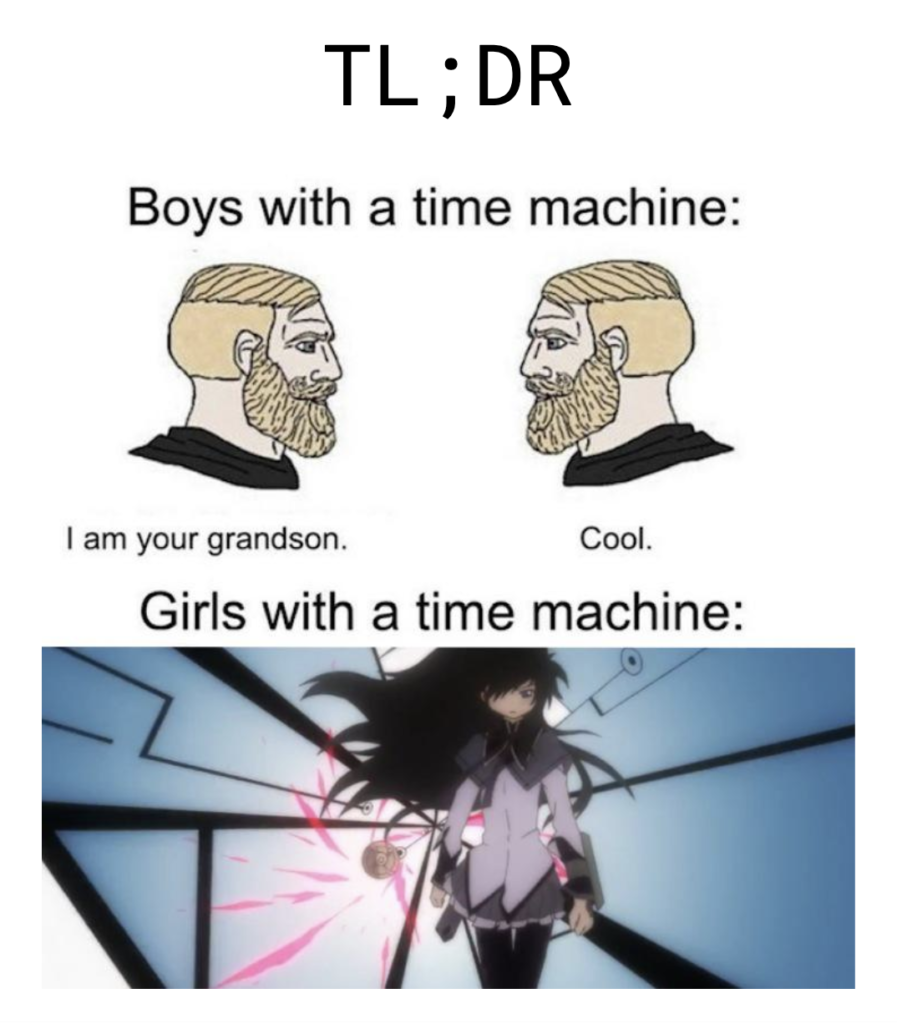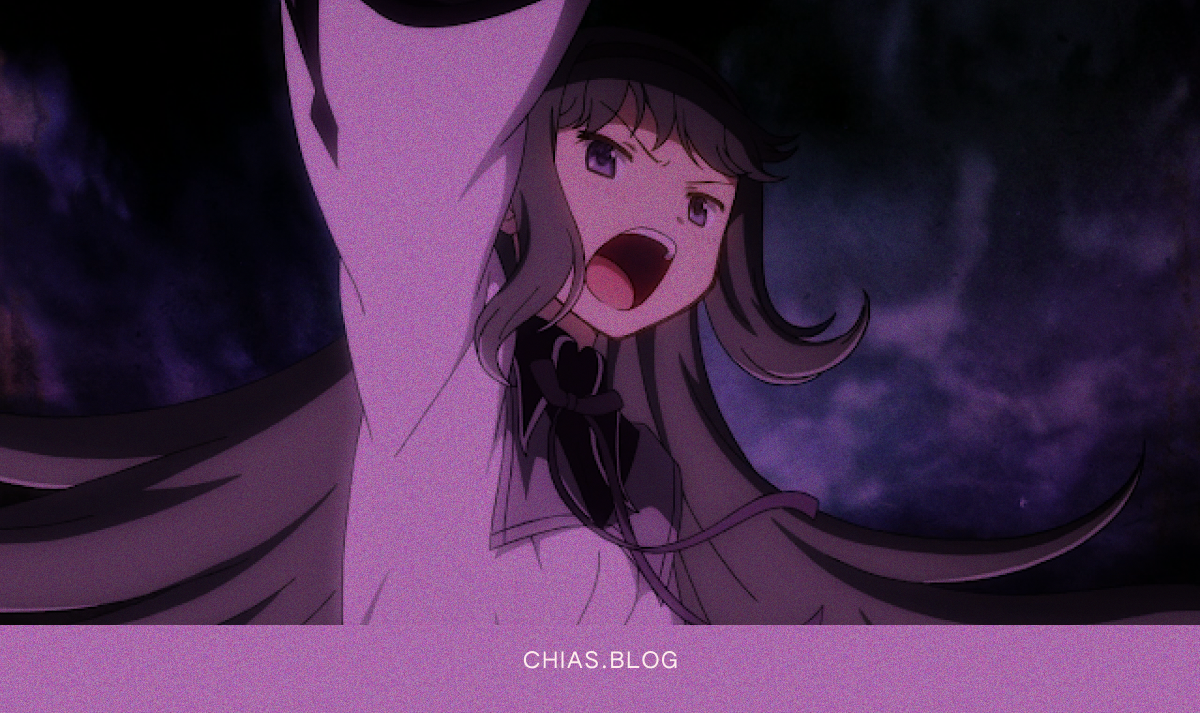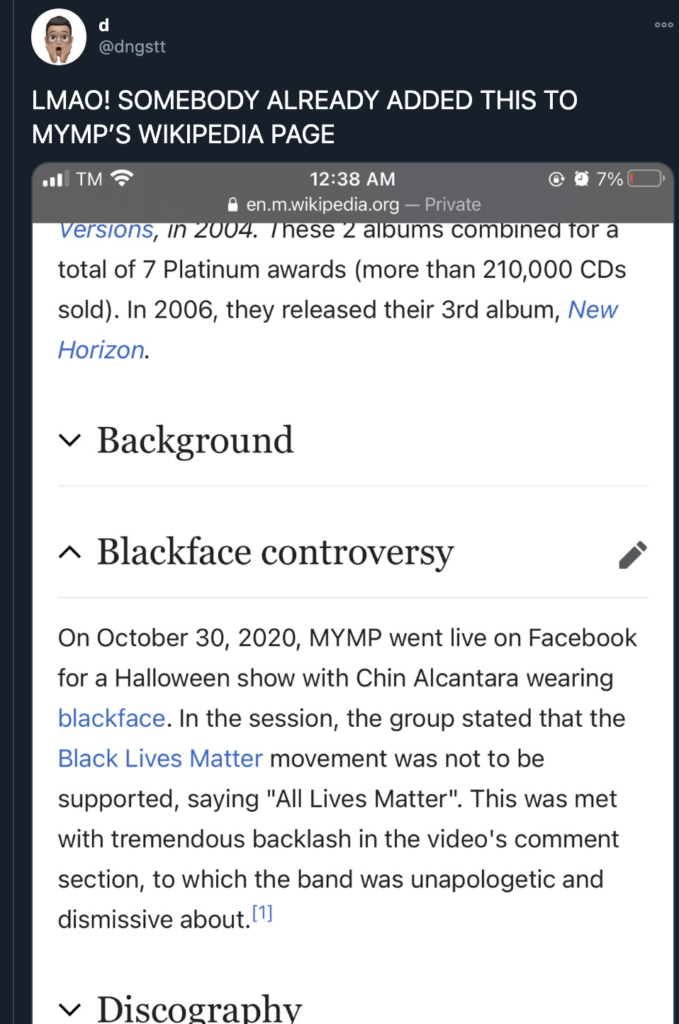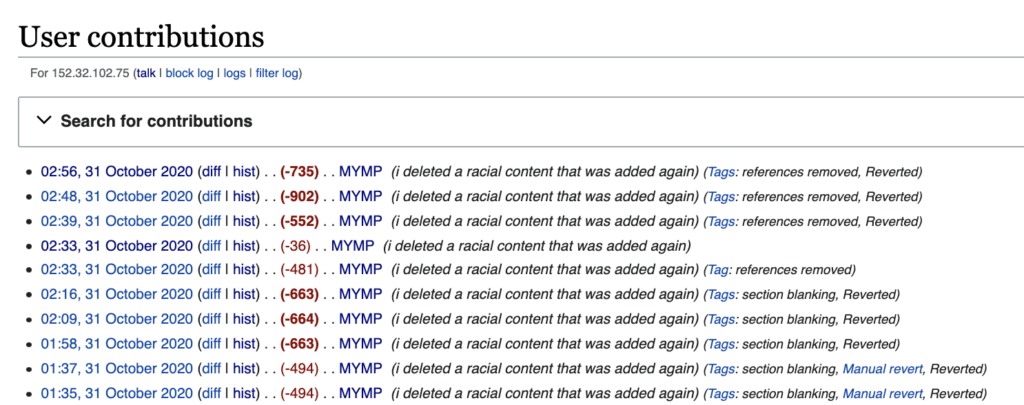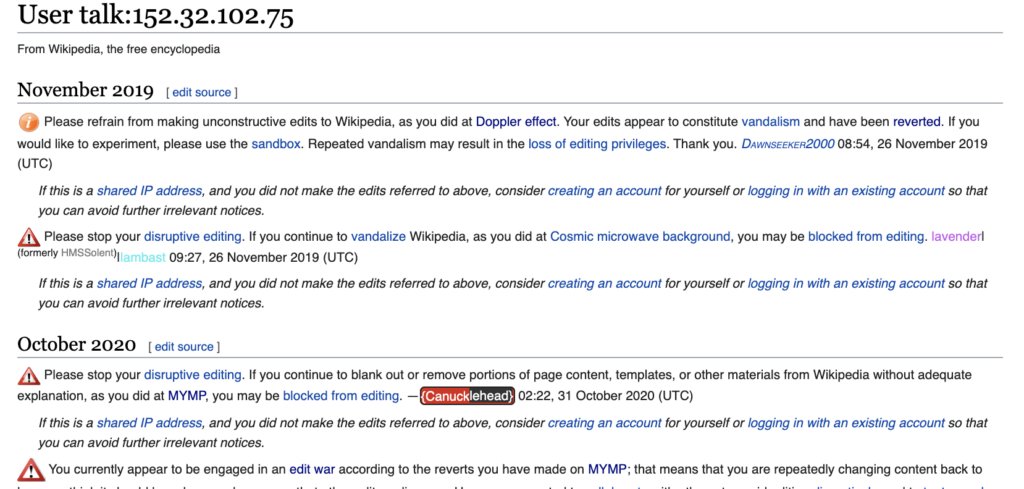A work-in-progress Homura Akemi character analysis I wrote for a Discord “waifu competition”. Current reading time: 64 minutes
When I was thirteen, my life kind of revolved around a growing feeling of helplessness furthered by a first misinterpreted Evangelion (plus other starter psychological anime) watch. From the teenager I was then, one of the most lasting watches was Puella Magi Madoka Magica. I didn’t know about my complicated feelings towards my gender or sexuality (this crisis would arrive in my late teens), finishing the show and its movies over three days.
Obvious Madoka Magica spoilers incoming––please watch the series and its movies if you haven’t yet. Twelve short 20-minute-or-so episodes.
It’s not the most groundbreaking dynamic, but the first time it’s presented to you sticks. It traces the familiar feeling of struggle against divinity and time––resilience and war against human mortality. As someone young and unknowingly queer, Madoka Magica was unwittingly the most important thing for me to have watched. I go back to the series every few years – a little older and hopefully wiser as well – and get blown away by all the little things.
The Homura Akemi Essay, Pt 1
FOR HOMURA, THE GOOGLE DOC
PUELLA MAGI MADOKA MAGICA ARE.NA
(MANDATORY) ACCOMPANYING HOMURA AKEMI SPOTIFY PLAYLIST
My friend’s Discord is in the midst of a perpetually-paused waifu competition where we hyperventilate over pixels and pull out paragraphs over characters with three collective minutes of screentime. Naturally, I’m inclined to defend Homura Akemi as one of the most complex, intriguing characters of all time.
Here’s my unfinished essay and some highlights.
Highlights
Summary of Madoka Magica and Rebellion
Puella Magi Madoka Magica, 12-episode Anime
- Madoka encounters Kyubey (the cat thing) who offers young girls a wish in the exchange of them signing a contract to become a magical girl
- Upper-year named Mami encourages Madoka and friend to accept contract, shows them her life
- Homura enters as a loner cool girl who is distrustful of Mami and discourages them from accepting the contract
- Madoka watches Mami die at the hands of witches, what magical girls are bound to battle — magical girl lives are filled with suffering, and they give up their souls to be able to battle these. She is wary of kyubey now
- Magical girls become witches when their soul despairs/when they die
- These girls (age 13/14) battle purity and hope, make very selfless wishes
- Madoka learns that Homura is a magical girl from a different timeline who has repeated the same month over 100 times to save Madoka and stop her from accepting the contract
- Powerful witch appears, Homura dies/tries 3942934 times to stop the witch from destroying the city
- Madoka finally makes a wish and becomes a magical girl, her wish is to stop the creation of all witches in all eternity, past, present, and future
- Existence is rewritten with Madoka’s sacrifice
- A new reality is formed. Homura is the only one who remembers Madoka
Madoka Magica the Movie Part III: Rebellion
- Takes place after the 12-episode show
- Madoka is omnipresent god who made the sacrifice
- Homura hates this – Madoka’s loss of her life, all the people she loves (not even homura herself but just her family and friends!) is not a happy end or ideal
- Homura basically fucks up the demon cat who thrives off the despair of innocent young girls
- Homura allows herself to be destroyed in this fight to rewrite the fucking universe and laws of hopelessness intrinsically embedded into living
- Madoka tries to cleanse Homura of how she was cursed and help her transcend to a higher plane or some shit, but Homura traps Madoka — Homura reveals that her curse is fueled because of love, not despair
- Homura removes Madoka’s divinity and godliness, freeing her
- In the universe Madoka shaped free of suffering and witches, Homura creates a distinct space, enclosed from the larger universe and the majority of our world’s timelines where Madoka lives on as human, and is free — without Homura
- Homura accepts that in this fragment of reality where Madoka is happiest — this one singular place, of all the timelines she has encountered and fought endlessly to build — she is bound to become Madoka’s enemy
The Laws of Thermodynamics
The Puella Magi Madoka Magica anime (note: it was developed as an animated show first, and has no source manga or anything else) utilizes a fictional interpretation of thermodynamics, particularly around entropy, as basis for its magic system. I go into it a bit here. Note that I am a CS major.
In 10100 years, every subatomic particle in the world will have been doomed to become ever-smaller, ever-hotter. All forms of matter in the universe will stray further apart from one another in our ever-expanding vastness that light will eventually be unable to travel from object to object; the subatomic composition of the universe will struggle under heat. It will first take humanity and the stars, it will bear no mercy for the sun or celestials, and even gravity will succumb to this expansion. Heating up higher and higher, these baryons will then evaporate––expanding into the near-infinity of everything in human history past, present, and future––until the universe remains solely of photons. Our cosmic fate is inevitable. Like every being bound to existence, the universe too is an exhausted one. She will run out of gravitational potential energy as the cosmic being of man comes increasingly relative: the atoms, the animals, our understanding, as the vastness and void increases. Our life will become shorter and shorter, until it is indistinct to us even today. For every infinity, there is a finite cosmic scale waning. The end of days will become a date on the calendar, each human experience incomprehensible in an already gradually neglectful universe, and man, fearful or not, will be subject to the reckoning of the universe.
The pain here is oblivion. Oblivion in consistency and constant, the regularity of temperature throughout our galaxy as we lose the minute irregularities from the Big Bang’s then-cooling and expanding universe. Isotropy to an extreme will no longer sustain life, it will bring us to a doom worse than suffering: consistency. All time, meaning, and interactions within become meaningless. Nothing interesting will ever happen again. The cataclysm of the universe is in the form of nothingness; not of dreariness or eternal war––it is in the suspension of time just a fraction of a degree above absolute zero.
With enough time in a single wave of these subatomic particles, the smallest inconsistency, the smallest iota of difference may mean the universe will come and be formed again. All of mankind is doomed to this polarity. It is unknown whether we have witnessed the beginning of our universe (time itself), or one universe in an infinite sequence.
Heat Death is one of four main, and countless other theories that dare seek out what the end of all things will be.
The heat death of the universe aptly comes from the laws of thermodynamics. Simply: if the universe lasts for long enough, we will eventually approach a state where all energy is evenly distributed, and the notion and memory of us, the figures before, all that come after, and all that surround us will dematerialize.
- Energy cannot be created or destroyed in an isolated system.
- The entropy of any isolated system will always increase.
“Entropy” will be referenced consistently throughout Madoka Magica. In-universe, it’s described as the principle that energy output is always less than energy input, a fact that is presently causing the universe to slowly die out. It is randomness, unstoppable, and endlessly increasingly––and is by force of nature, one of the many reasons why we must die.
Take a piece of copper wire. Maybe 5″ of nice, straight, copper wire. Now bend it in half. You have increased the randomness of the universe. Try and straighten it back out. You can’t quite get it back to the same level of orderly straightness that it was before. You might even have made it worse (because before it had just the one bend, and now it probably has at least three from you fumbling to try and approximate straightness).
As measure of the available states of our system, the total entropy of any isolated system (herein, the universe) shall continuously increase until the equilibrium spoken of with the universe’s heat death is obtained. After that moment, entropy will stop increasing. In all our galaxies and stars, entropy will increase until the heat death; the state of no thermodynamic free energy, unable to sustain any act that increases entropy. All reactions chemical, mechanical, quantum will become impossibility. Nothing shall ever happen or be.
Take the dropping of a ball. The spontaneous events that emerge from it. The explosion of a reactor. The reactions between hydrogen in oxygen. All our actions are essentially due to energy: spreading out, dispersing; whether it is because of an increase in volume due to the action or a system influenced by heat. The dispersal of energy leads our molecules to possess more arrangements after than before. Energy of all forms shall spontaneously disperse if it is not hindered from doing so. You can understand this is many forms: in terms of potential and kinetic energy and the influence of human action, or perhaps how hydrogen and oxygen in closed chambers may be unchanged and stagnant for years and years and millennia until a spark of mere activation energy causes them to react, producing water molecules, and spreading out energy in the process.
Our simple, meaningless actions contribute to the universe’s ultimate oblivion. Whenever gas expands in any system, the entropy of the system increases. When we flick our fingers, take a step, and make the slightest gesture, we produce entropy. Our body is at constant odds and flux with the world around us: the body’s gestalt still nothing to the enormity of the world––yet the tap of a finger causes irreversible, permanent friction to the air, creating rifts in temperature, increasing entropy. No action thus can be done without the existence of entropy. The entropy contained in our galaxies will never decrease. Measured in smaller systems such as the flick of a hand, we can determine (or rather, observe) the changes in entropy within systems by measuring initial and terminal states–a finger static and stagnant on my screen, then its place a second later. The same observation can go for the universe: the unknowable beginning, and the inevitable end.
Another important thing to consider is how anthropocentric entropy is as a concept. It takes more energy for us to create a glass (in the process of heating sand to exorbitantly high temperatures of 1700 celsius, causing it to transform at the molecular level and turn into its molten form; glass objects today use countless molds and additional chemicals to change their finish) than to break it (me shattering a bottle by dropping it).
Madoka Magica presupposes a universe where the worst fate for all beings is an eternity of nothingness–not human error, suffering, or misery nor the loss of happiness, joy, and serenity per se, simply the inability to go back and yearn for another infinity.
We understand these are the universe’s ultimate fates. We can also look at what the end of humanity (and thus, of individual beings) may lead to: eternal flourishing, endless stagnation, or ultimate extinction. It is only in the case of extinction that we are truly doomed: with an inability to act, move, or do––with a frozen system with no more possibility or action behest.
ENTROPY IN THE WORLD OF PUELLA MAGI MADOKA MAGICA
But why exactly is entropy so important in the world of Madoka Magica?
In the world of PMMM, magic is founded upon the fluctuation of emotion, unshackled from the laws of thermodynamics (“energy cannot be created or destroyed in an isolated system”).
While everything in our universe is constant (i.e. all we produce, make, or do, are results of system changes in the matter that has existed since the beginning of time), feelings and emotion are the one things that are uniquely ours to instantiate. Our consciousness and emotions are not isolated systems (which the laws of thermodynamics must operate in.)
An isolated system is free from influence of external forces that may affect the system––it cannot exchange either energy or matter outside the boundaries of the system.
There are no truly isolated or closed systems in the world, only approximations. The universe itself, however, is considered an isolated system because the energy of the universe (all energy that exists) is constant––thereby fitting this definition.
Majority of the emotions we experience day to day are transient. It’s when our moods fluctuate to the primary emotions of anger, fear, pleasure, sadness, and disgust do they become significant. In Madoka Magica, emotions faced by young girls become central to its story.
PUELLA MAGI MADOKA MAGICA
“A girl is offered a wish in exchange for a commitment to battling witches, a group of magical beings whose souls have been tainted by darkness.”
Briefly––Puella Magi Madoka Magica (hereafter PMMM) opens with Madoka Kaname, a middle-schooler who meets a cat-like creature called Kyubey. Kyubey offers Madoka and Sayaka Miki the opportunity for any wish of theirs to be granted, in exchange for a contract. The contract binds them to become magical girls, dutied to fight creatures called “witches” that feed off misery. In the process of contracting with Kyubey, he provides magical girls Soul Gems now placed on their body: a source for their powers and gear, enabling them to transform into their magical girl form to fight off witches.
The gift of the soul gem is one that is also the spell of doom. The gem birthed from contracts with these messengers of magic serve as proof of one’s magical girlhood, and become the source of her magical power. Whenever magical girls use abilities, the soul gem becomes “intanted”, her soul gem darkening and weakening. In-series, the only way to rid the soul gem of its taint is to use a grief seed, a witch’s egg that appears upon its defeat that appears after witches are defeated.
When used on soul gems, grief seeds deplete the grief out of soul gems, cleansing it and purifying it to its original form (though it is warned that absorbing too much grief can revive witches).
TIMELINE ONE: HUMAN HOMURA
On March 16th, the fourteen-year-old Homura Akemi is released from the hospital after being bedridden for half a year. Madoka Kaname meets Mami, contracts with Kyubey while wishing to save a stray cat that gets hit by a car two days after Homura wakes up in the hospital and leaves. Madoka becomes a magic girl on March 1
March 25th, Homura finally transfers to school and meets Madoka. She shows Homura around, is aware of her health condition, and brings her to the nurse when she needs to take her medication. Almost immediately, Madoka asks if she can call her Homura-chan.
They stop in the hallway, she calls her name wonderful, and Homura blushes.
Walking across a bridge and contemplating her first day of school, Homura suddenly finds herself in the labyrinth of the witch Izabel. Right before she’s attacked by the Witch’s minions called “familiars”, she encounters Madoka Kaname and Mami Tamoe fending the familiars off, Kyuubey explaining briefly that they’re “magical girls who fight witches”, and she heads to Mami’s house for tea where Madoka explains that she had just contracted with Kyubey the weak before. They tell Homura to not tell anyone in class. “The more witches we defeat, the more people we save,” Madoka explains.
The girls are happy, cheerful, and carefree middle schoolers. Their lives are relatively normal despite their magical girl duties.
An evil, near-unstoppable witch called Walpurgisnacht is approaching. We jump to Mami’s death in this timeline, Homura still as a human, non-contracted observer who is assured by Madoka that as a magical girl, she’s the only one left who can face Walpurgisnacht and must protect everyone. “No one would ever blame you,” Homura explains, in case of the end of the world.
Known to her as she jumped into battle, Madoka is unable to defeat Walpurgisnacht and dies as Homura cries over her crumbled, bloodied body. (We get closer shots of her palms in Episode 10, where the slashes and scars over them are likened to the crucifixion of Jesus Christ.)
“But this time, instead of her protecting me, I want to become strong enough to protect her!”
HOMURA’S WISH
SETTING THE FOUNDATION FOR HER PRESENCE IN THE SERIES
“Your wish has prevailed over entropy,” Kyubey grants. Homura first becomes a magical girl, gaining her status and traveling back in time to her first waking in the hospital. Her wish has manifested in the form of her gaining her limited time control powers (hence “your wish has prevailed over entropy”––the reversal of time in itself is a rift against what Kyuubey is aiming for––Homura’s very existence as a magical girl subsists on her ability to reject the laws of the universe, and subvert the exploitation of incubators on her.
Homura becomes Madoka’s protector. Homura becomes protector to not only Madoka, unbeknownst to her, she becomes savior to the rest of the girls in the series as well.
In every timeline, she returns to the hospital: a symbol of her frailty, weakness, and illness that she never succumbs to nor seems to return to again.
In every timeline thereafter, one of the first things Homura does after waking up in the hospital is to save the cat outside the hospital, Amy.
From this initial sequence of events, Homura travels about a hundred more timelines to save her friend and the universe.
Contracting with Kyubey and the Incubators
In twelve episodes, we explore Kyubey (officially dubbed in plot summaries as one of many “messengers of magic”) conspiring to manipulate five school girls by offering them one wish, binding them the irreparable duty and weight of human darkness. Witches, evil creatures that are born from curses, cause havoc in the waking human world, and are “responsible for murder and suicide” plague and follow these girls. Unbeknownst to these fourteen-year-olds who have barely experienced life, the contracts exploit them for their humanity.
The range of emotion that young human girls face, specifically in their growth stage developing sex characteristics (age 14–18), generate inordinate amounts of energy. However, Kyubey’s alien species (“incubators”––hence kyubey) is incapable of emotion. The potentiality of young human girls was discovered after Kyubey’s hyperdeveloped species scoured the entirety of our Universe to find the species with the most emotional potential. It is of Kyubey’s desire to harvest the energy from young girls’ emotions to “stockpile” energy to prevent against the inevitable heat death of the universe, postponing maximum energy with Magic’s potential to create new ones.
To harvest this energy and prevent the destruction of the Universe, Kyubey recruits magical girls to defend the earth from witches. But, the goal of Kyubey and the rest of the incubators is withheld from these girls––it is not to contract magical girls, but to create the Witches that they are binded to fight––their final form. Towards the end of the Madoka Magica series, it is revealed that Witches, once the main antagonist (that always appear in beautiful, twisted labyrinths in a fucking strange, gorgeous collage style) are the actual “grown” and elder forms of magical girls.
Thus is the cyclic doom that magical girls are doomed to. When it is revealed to the Madoka cast that their fate is to end up as witches, they realize that they are doomed to fight and kill themselves and each other. Their soul gem taints in the battle against beings that were once young, human girls just like them––and from these tainted gems, witches will erupt. Negative feelings such as despair and misery catalyze the tainting of the Soul Gem, and the mere act of existence under the contract means that magical girls will continue losing powers, needing grief seeds––even if they attempt to stand back against the fate they’re doomed to fall into. Grief also is accumulated in everyday acts, that is, the mere act of surviving and living will poison the Soul Gem, even if magical girls refuse to fight.
“Do you even know how the food comes to sit on your table?
Do you ever feel bad for cattle?
Do you feel any guilt or remorse for the livestock you consume?”
Kyubey compares the relationship between their species and that of humanity’s as like human and cattle. A “reasonable and mutually prosperous relationship”, Kyubey claims. We have not given livestock a choice; theoretically, they get the benefits of being fed, protected, and taken care of, until they are doomed to their fate of consumption. Yet we live with them side-by-side. Humanity of course, has a higher degree of sentience.
Novelist Jonathan Safran Foer asks, “If we were to one day encounter a form of life more powerful and intelligent than our own, and it regarded us as we regard fish, what would be our argument against being eaten?”
In the PMMM universe, humanity is essentially faced with this evil, magical-bearing, emotionless race thriving off the emotional manipulation of young girls. We’re plagued with the same debate that follows us in our day-to-day ethics of consuming meat and livestock; despite every fundamental difference (e.g. the incubators do not feel emotions and cannot grasp the enormity of human pain, especially on young girls; animals cannot feel with the same complexity that humans do), we still bind each other to the same terrible fates. This cruelty is negligible in the Madoka Magica universe, and serves as a core line of reasoning for Kyubey to challenge the girls and their sorrows, presenting himself not as a villainous being–but a bearer of truth and justice at the expense of the few.
Kyubey is almost a disgustingly outright parody of the Cartesian thought: “I think, therefore I am”; humans know everything of the self and its mysteries, but we cannot know of anything certain that is beyond our own selves. That is, reason is supremacy.
Even if we were to discount the fact that Kyubey and the incubators scoured the entire Universe to discover that magical girls were the most delightful sources of emotion and pain, it does seem like their innate reason is inarguable: the end of the universe is bad. They must know that this is the ultimate fate of the universe, and their species must have long survived before the existence of humanity and will existence long after the fact––we are not a mere speck in the timeline of the incubators, moreso that of the universe in and of itself. But unadulterated reason does not equal godhood in a narrative that revolves around the strength of human emotion, and how human emotion is stronger than deities, gods, and the laws of the world itself. In a universe where human emotion is Magic, can reason truly trump feelings? Can the reason that Kyubey so desperately try to exploit over and over again until a mere hundred loops fucks him up (100 loops = about 26 years, so think about other fates where magical girls could have overcome the incubator race and used magic to enslave and reverse the relationship between a supposedly hyperadvanced species). Emotion itself is unstoppable. We will forever be pondering it, and it does seem like the lack of grasp that the incubators have over human turbulence will lead to their downfall. Humans are irrational creatures, after all.
Like the miraculous chance of being born unto the universe and the tableau of the universe itself, we’re doomed to a fate. Is it a blessing that we’ve gotten to live this far in the first place?
TL;DR
